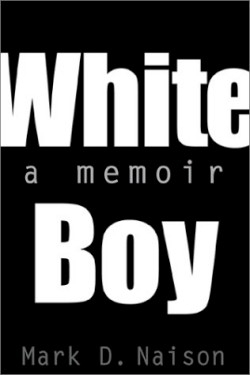White Boy
A Memoir
This lively coming-of-age memoir tells why the author, a Jewish boy from Brooklyn, decides to spend his career teaching African-American studies, a discipline in which white males have often been regarded as curiosities. His biography is reminiscent of such recent excellent works of this genre-Honky, by Dalton Conley (University of California Press, 2000) and Commies, by Ronald Radosh (Encounter Books, 2001)-and also provides a thoughtful, personal observation of interracial relations.
Naison’s positive attitudes towards African-Americans were nurtured by such sports heroes as Jackie Robinson and Willie Mays, and by rock and roll, a new music with distinctive African-American roots. His parents were public school teachers who did not share their son’s feelings: “To them African-Americans were not a people with a tragic history; they were goyim ready to turn against Jews when it was convenient to do so.” His mother refused to accept or acknowledge Ruthie, Naison’s African-American partner of six years. The author’s recounting of his interracial relationship is told sensitively, as he describes how he was warmly received by Ruthie’s extended family while his own family rejected her. Ruthie’s health problems, responsibility for her younger siblings, and the pressures of black separatism eventually drove the couple apart.
At Columbia University, which he entered in 1962 at the age of sixteen, Naison became involved in the civil rights and antiwar movements. In 1970, while a graduate student at Columbia, he accepted a position in the new Institute of Afro-American Studies at Fordham University. At times he was regarded by much of the Fordham faculty as “the resident oddball-the white Jewish radical in African-American studies.” The students and other members of the Institute, however, welcomed their only white member as a role model for all races and as a spokesman for what eventually became a full-fledged department of the University. Naison offers a fascinating insider’s account of the campus politics and controversy that often involves African-American studies.
Naison still teaches at Fordham and appreciates current students, in whom he sees a resurgence of activism and increasing interest in African-American history. This memoir presents a fascinating look at the journey of activists energized by the struggle for racial and gender equality from the 1960s into the new century. Naison is a personable and worthy guide.
Reviewed by
Karl Helicher
Disclosure: This article is not an endorsement, but a review. The publisher of this book provided free copies of the book to have their book reviewed by a professional reviewer. No fee was paid by the publisher for this review. Foreword Reviews only recommends books that we love. Foreword Magazine, Inc. is disclosing this in accordance with the Federal Trade Commission’s 16 CFR, Part 255.

